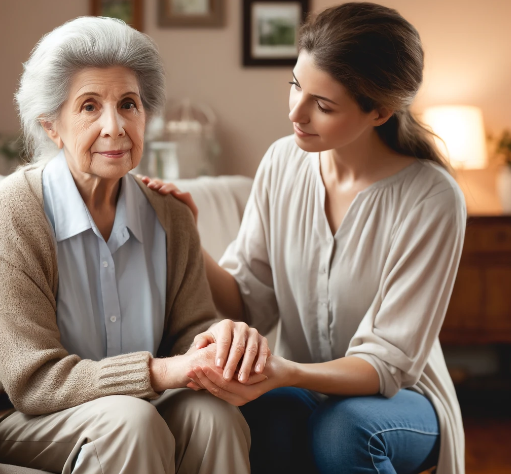Caring for the elderly with dementia presents a unique set of challenges and rewards. Understanding is crucial for providing compassionate and effective care.

This article explores various facets of dementia care. It focuses on the emotional triggers and family dynamics that play a significant role in the day-to-day management of this condition.
The insights shared here aim to equip caregivers with the knowledge and tools necessary for enhancing the quality of life for their loved ones with dementia.
These include navigating grief and loss to managing difficult behaviors and environmental triggers,
Understanding Emotional Triggers in Dementia Patients
Let’s start by exploring emotional triggers and just why they’re so crucial in dementia care.
First, what are emotional triggers? They are specific stimuli that provoke a strong emotional response in individuals with dementia.
These triggers can range from certain words and environments to particular people and past events. They’re incredibly significant because they can affect the person’s well-being, comfort, and behavior.
You’re going to find out about the various common emotional triggers those with dementia may experience. Things like a change in routine, unfamiliar surroundings, or even certain smells and sounds can cause agitation or distress.
In addition to identifying these triggers, it’s important to understand that each individual with dementia is unique. Therefore, what may be a trigger for one person might not be for another.
Next, let’s look at how to handle these emotional peak moments. Techniques such as maintaining a calm environment, using soothing language, and ensuring consistency in care are key.
Furthermore, you can adjust your approach down the road as you learn more about what works best for the individual you’re caring for. Choose something that resonates with you when it comes to person-centered approaches.
This goes beyond maintaining a standard care plan. It’s also about tailoring your responses and environment to suit the person with dementia. For instance, it’s making sure they feel heard, understood, and respected.
Ultimately, your empathy and flexibility can make a world of difference in managing emotional triggers.
Now, with these principles in mind, we’ll naturally segue into the role of family dynamics in dementia care.
Understanding emotional triggers is one thing. However, when we add family relationships and the grief that often accompanies a dementia diagnosis, things can get pretty complicated. And that’s exactly what we are going to unravel in the next section.
Navigating Family Dynamics and Grief in Dementia Caregiving
Caring for an elderly loved one with dementia doesn’t just challenge the person with the diagnosis; it profoundly affects the entire family.
As dementia progresses, it can alter family dynamics, roles, and relationships. What once was a parent-child dynamic may shift, with the child becoming the caregiver.
Siblings may find themselves at odds over care decisions or grappling with the uneven distribution of responsibilities. Therefore, understanding and navigating these shifts is crucial for maintaining family cohesion and providing effective care.
Moreover, grief is an often-overlooked component of the dementia journey. Yet, it’s pervasive for families and caregivers. It begins with the diagnosis and continues throughout the progression of the disease, as successive losses occur.
This type of grief, sometimes called ambiguous loss, is challenging because there is no closure. For example, your loved one is there, but not in the way they once were.
Openly acknowledging this grief and providing a safe space for family members to express their emotions is essential.
Effective communication is the cornerstone of navigating family dynamics in dementia caregiving. It involves establishing regular meetings for the following:
- To discuss care plans.
- Delegating tasks based on each person’s abilities and time.
- And respecting differing opinions and emotions.
Additionally, it’s important to reach out for professional help if conflict becomes a significant barrier to care. Family counselors, especially those experienced in dementia care, can offer invaluable guidance.
Also, family members need to learn coping mechanisms for the changes and losses they witness. This can involve:
- Joining support groups.
- Engaging in individual therapy.
- Or finding educational resources to better understand the disease’s trajectory.
The goal is to build a solid, united front where the wellbeing of the person with dementia and the resilience of the family are both prioritized.
Practical Approaches and Environmental Considerations for Difficult Behaviors
Handling difficult behaviors in people with dementia is more than just reacting to what’s happening. More importantly, it’s about understanding the why behind actions and using that knowledge to create peaceful outcomes.
Difficult behaviors can range from agitation and aggression to wandering and restlessness. As such, it’s crucial to figure out what might be causing these behaviors.
Is it discomfort, confusion, a reaction to medication, or something else entirely? Once you have an inkling, you can start to tailor your approach.
You’re going to find out about practical strategies like:
- Redirecting attention.
- Establishing routines.
- And the power of a calm, reassuring presence.
- Consistency is key, as is patience.
But let’s not forget the surroundings. For example, something as simple as lighting and noise levels can make a world of difference.
Similarly, a clutter-free space with personal, familiar items can soothe and ground someone with dementia.
This brings the question: How else can the environment affect behavior? Well, there’s overwhelming evidence pointing to the influence of a structured, secure, and supportive environment on behavioral responses.
Your first attempt doesn’t need to be your last. Tweak the environment, see what works, and remember, supporting the emotional needs of a person with dementia is just as important as addressing their physical needs.
Support Strategies for Those Caring for Loved Ones with Dementia
Caring for someone with dementia is a path filled with emotional highs and lows, and it’s easy to overlook the well-being of the caretakers themselves.
It’s crucial that if you’re in this role, you take steps to ensure your own health and happiness.
Hence, establishing a support network is vital. It’s a tough journey, and having people to lean on can make all the difference. This could include friends, support groups, or professional services.
Remember, asking for help isn’t a sign of weakness. Rather, it’s a practical step to manage your own life while being there for your loved one.
Let me stress the power of using memory triggers in a positive way. While they can sometimes lead to confusion or distress for individuals with dementia, they can also evoke joyous recollections and connections to the past.
For example, choose something that resonates with your loved one and witness the profound joy that a certain song, photo, or scent can bring.
However, be mindful that these triggers are a double-edged sword. Be prepared for any emotional responses they may elicit, and don’t be discouraged if the outcome isn’t always positive.
Ultimately, it’s part of the learning curve that comes with understanding your loved one’s needs.
Finally, developing resilience and emotional intelligence is non-negotiable for caregivers. What I mean is this: The dementia journey is unpredictable, and being adaptable will not only help your loved one but also preserve your own mental health.
A caregiver who can navigate the emotional landscape of dementia with understanding and patience is an invaluable source of comfort to their loved one.
Conclusion | Caring For The Elderly With Dementia
The journey of caring for someone with dementia is complex and deeply personal. As caregivers, understanding the intricacies of dementia is crucial for providing compassionate and effective care.
Remember, vital components of effective dementia care are:
- Recognizing and responding to emotional triggers.
- Adjusting to family dynamics.
- And understanding the subtle nuances of memory and environment.
By adopting the strategies and perspectives discussed in this article, caregivers can foster a more nurturing and stable environment for their loved ones.
Ultimately, the goal is to ensure that despite the challenges dementia may bring, moments of clarity, joy, and connection remain possible and are cherished.
Finally, as you support your loved one with dementia, don’t forget to bolster your own resilience.
Embrace the support around you, utilize memory triggers wisely, and continue to learn and adapt to the unique challenges this condition presents. By taking care of yourself, you’re ensuring that you can provide the best care possible for your loved one.
You or someone you know may be able to relate to “Caring for the Elderly with Dementia.” Please feel free to share your thoughts, questions, or comments below. I’d love to hear from you and will be happy to respond.
Veron | Entrepreneur | The Way 4WordEnterprises
Personal Recommended Resources:
Another Daughter TM | A senior care service for independent Seniors living in or around Raleigh, NC
